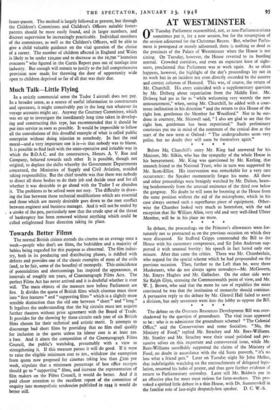AT WESTMINSTER
ON Tuesday Parliament reassembled, not, as non-Parliamentarians sometimes put it, for a new session, but for the resumption of the session adjourned for the Christmas Recess. But, whether Parlia- ment is prorogued or merely adjourned, there is nothing so dead as the precincts of the Palace of Westminster when the House is not sitting. On Tuesday, however, the House reverted to its bustling normal. Crowded corridors, and even an expectant knot of sight- seers, proclaimed that Parliament was at work again. As so often happens, however, the highlight of the day's proceedings lay not in its work but in an incident not even directly recorded in the austere and correct columns of Hansard. This was, of course, the return of Mr. Churchill. His entry coincided with a supplementary question by Mr. Driberg about repatriation from the Middle East. Mr. Driberg had got as far as " while welcoming very warmly the new announcement," when, seeing Mr. Churchill, he added with a cour- teous inclination in his direction " and the return to this House of the right hon. gentleman the Member for Woodford." Not to be out- done in courtesy, Mr. Shinwell said, " I also am glad to see that the right hon. gentleman has been repatriated." Such preliminary courtesies put me in mind of the comment of the cynical don at the start of the new term at Oxford: " The undergraduates seem very
polite, but no doubt they will soon be themselves again." * * * * Before Mr, Churchill's entry Mr. King had answered for his Minister, Mr. Silkin, who has the sympathy of the whole House in his bereavement. Mr. King was questioned by Mr. Keeling, that staunch friend to the National Trust, who in turn was supported by Mr. Scott-Elliot. His intervention was remarkable for a -very rare occurrence : the Speaker momentarily forgot his name. All these and other proceedings were benignly watched by Mr. Dalton, beam- ing bonhomously from the unusual eminence of the third row below the gangway. No doubt he will soon be booming at the House from the same position without the aid of the microphone, which in his case always seemed such a superfluous piece of equipment. Other- wise the Chamber looked very much as heretofore, with the sad exception that Sir William Allen, very old and very well-liked Ulster Member, will be in his place no more. * * In debate, the proceedings on the Princess's allowances were for- tunately not so protracted as on the previous occasion on which they were discussed. Sir Stafford Cripps commended the Bill to the House with his customary competence, and Sir John Anderson sup- ported it with unusual brevity: his speech in fact lasted only one minute. After that came the critics. There was Mr. Chamberlain, who argued for the special scheme which he had propounded on the previous occasion. Then, further to the Left than he, were three Musketeers, who do not always agree nowadays—Mr. McGovern, Mr. Emrys Hughes and Mr. Gallacher. On the other side were Sir Ralph Glyn, stressing the Commonwealth point of view, and Mr. W. J. Brown, who said that the more he saw of republics the more convinced he was that the institution of monarchy should continue. A persuasive reply to the debate by Mr. Glenvil Hall failed to avert a division, but only seventeen went into the lobby to oppose the Bill. * * * *
The debate on the Overseas Resources Development Bill was over- shadowed by the question of groundnuts. The vital issue appeared to be: who is to administer the groundnuts scheme? "The Colonial Office," said the Conservatives and some Socialists. "No, the Ministry of Food," replied Mr. Strachey and Mr. Rees-Williams. Mr. Stanley and Mr. Strachey were their usual polished and per- suasive selves on this important and controversial issue, while Mr. Rees-Williams unselfishly supported the claims of the Ministry of Food, no doubt in accordance with the old Scots proverb, "it's no loss what a friend gets." Later on Tuesday night Sir John Mellor, that indefatigable watchdog on the encroachments of delegated legis- lation, resumed his habit of prayer, and thus gave further evidence of return to Parliamentary normalcy. Later still Mr. Baldwin put in an effective plea for more meat rations for farm-workers. This pro- voked a spirited little debate in a thin House, with Dr. Summerskill in the familiar role of late-night despatch-box speaker. D. C. W.-S.






























 Previous page
Previous page